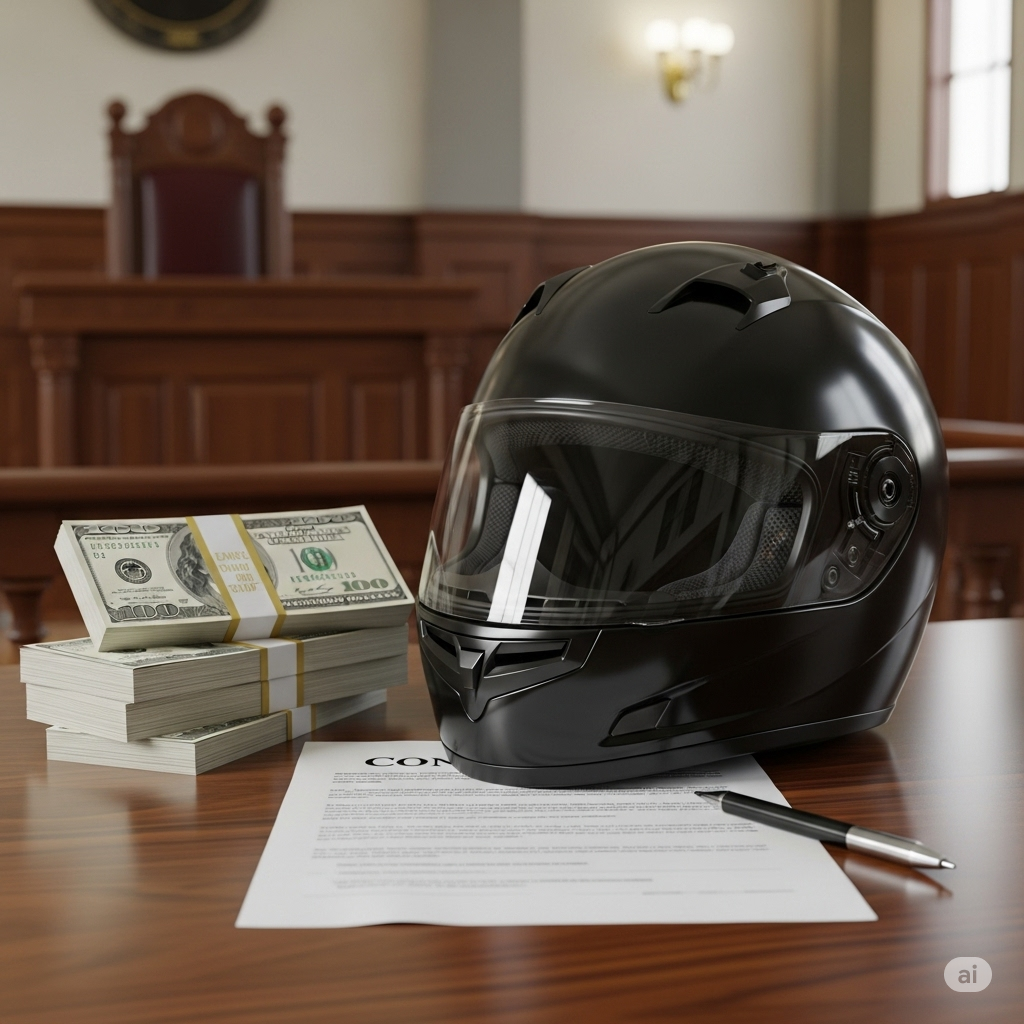Motorcycle accidents are among the most destructive on the road. Moreover, motorcycle accident lawyer helmet laws play a crucial role in determining insurance outcomes. Riders face a higher risk of serious injury or death due to limited protection compared to cars.
As a result, many states have passed helmet laws aimed at reducing fatalities. However, what most riders don’t realize is that both wearing a helmet and the laws surrounding it can significantly influence how insurance companies handle claims.
Behind the scenes, insurers don’t just use helmet laws to assess risk. They often manipulate these laws to minimize or deny legitimate compensation.
Understanding Helmet Laws and Their Impact on Motorcycle Accident Claims
Universal vs. Partial Helmet Laws
Helmet requirements vary by state:
- Universal Helmet Laws: All riders must wear helmets (e.g., California, New York).
- Partial Helmet Laws: Only certain riders must wear helmets based on age or license status (e.g., Florida, Texas).
States Without Helmet Requirements
Some states, such as Iowa and Illinois, do not require helmets at all. While this offers riders more freedom, it often weakens personal injury claims when an accident occurs. Insurance companies frequently cite non-helmet use as negligence, even when it’s not required by law.
How Insurance Companies Use Helmet Laws Against You
1. Reduced Compensation Based on Helmet Use
Insurance adjusters commonly reduce compensation by arguing that injuries could have been avoided or minimized with helmet use. This occurs even in states without universal helmet laws.
2. Comparative and Contributory Negligence Rules
In states with comparative or contributory negligence:
- Pure Comparative Negligence: You can recover damages reduced by your fault percentage.
- Modified Comparative Negligence: No compensation if you are more than 50% at fault.
- Contributory Negligence: Any degree of fault (even 1%) bars recovery.
For example, if you’re found 30% at fault for head trauma due to not wearing a helmet, your payout may be reduced by that amount.
3. Claim Delays and Denials
Insurers delay or deny claims, claiming they need to investigate whether helmet non-use worsened the injury. These tactics pressure victims to accept reduced settlements.
4. Helmet Discounts as a Legal Loophole
Some insurers offer premium discounts for helmet use. Accepting these discounts may be used against you if you later ride without a helmet and suffer injuries.
Helmet Use and Legal Liability in Motorcycle Accidents
Does Helmet Use Affect Fault?
Fault is based on who caused the crash not helmet use. However, helmet use influences how much compensation is awarded, especially in head injury claims.
Legal Precedents and Case Examples
Court outcomes vary:
- In some cases, courts side with riders, stating the helmet would not have prevented the injury.
- In others, failure to wear a helmet has led to significantly reduced payouts.
A motorcycle accident lawyer can use these precedents to argue your case more effectively.
Case Study: How Helmet Use Impacted One Rider’s Claim
John, a 35-year-old rider in Texas, was sideswiped by a distracted driver. Though Texas has a partial helmet law, John wasn’t required to wear a helmet due to his age and license. However, he suffered a severe concussion. His insurer initially denied full payment, arguing the helmet could have mitigated his injuries.
With the help of a motorcycle injury lawyer, John presented medical evidence and traffic footage proving the accident’s cause had nothing to do with his helmet status. The court ruled in John’s favor, awarding him full compensation.
This example shows why legal representation is crucial.
Common Insurance Myths and Misconceptions
Myth 1: No Helmet, No Compensation
False. Not wearing a helmet may reduce your compensation, but it doesn’t invalidate your claim especially if the other party is at fault.
Myth 2: Admitting Fault Expedites the Process
Insurers may pressure riders into accepting blame. However, any admission can be used to reduce your payout under negligence rules.
Myth 3: Police Reports Are Final
While helpful, police reports are not binding. A motorcycle accident lawyer can challenge inaccuracies that affect your claim.
Why You Need a Motorcycle Accident Lawyer
Expertise on Helmet Laws
Attorneys understand the complex interplay between helmet laws and insurance tactics. They use this knowledge to defend your rights.
Maximizing Your Settlement
Lawyers collect evidence, reconstruct accidents, and work with medical professionals to validate your injury claims. This strengthens your position against insurers.
Navigating Insurance Company Tactics
Insurers employ lawyers and adjusters trained to minimize payouts. A motorcycle accident lawyer levels the playing field.
Steps to Take After a Motorcycle Accident
Seek Immediate Medical Attention: Always document your injuries.
Document the Scene: Take photos, gather witness contacts, save receipts.
Avoid Admitting Fault: Let your lawyer handle communication.
Hire a Motorcycle Accident Attorney Early: Early representation protects evidence.
File Your Claim Promptly: Statutes of limitations vary by state.
Bad Faith Insurance Practices
Sometimes, insurers act in bad faith by:
- Delaying legitimate claims without cause
- Misrepresenting policy terms
- Offering unfairly low settlements
If you suspect bad faith, your motorcycle accident lawyer can take legal action, potentially winning punitive damages.
Motorcycle Head Injury Settlement Value and Insurance Disputes
The term motorcycle head injury settlement value is a highly searched phrase with strong CPC and legal intent. Riders who sustain traumatic brain injuries often face lifelong medical expenses. Insurance companies aggressively minimize these claims.
Determining Motorcycle Head Injury Settlement Value
Settlements depend on:
- Severity of brain injury
- Long-term care costs
- Lost wages
- Emotional and physical suffering
Your lawyer will work with medical experts to estimate fair compensation and challenge insurer under valuations.
Why These Claims Are Frequently Disputed
Insurers know that brain injuries can lead to large settlements. They delay payouts, dispute diagnoses, or blame the rider’s helmet use (or lack thereof) to reduce their liability.
A strong legal strategy is critical to ensure you’re not shortchanged.
Conclusion: Protecting Yourself After a Motorcycle Crash
Motorcycle accidents can leave riders facing serious physical, emotional, and financial burdens. While helmet laws aim to increase safety, they are also exploited by insurers to reduce payouts. Understanding how motorcycle accident lawyer helmet laws affect your claim can protect you from insurance manipulation.
If you’ve been injured in a crash helmet or no helmet you deserve a fair evaluation. Consulting a knowledgeable attorney is your best defense against unfair insurance practices.
Frequently Asked Questions (FAQ)
Q1: Can I still sue if I wasn’t wearing a helmet?
Yes. Helmet use may influence compensation but doesn’t disqualify your right to sue if another party is at fault.
Q2: Will my payout be reduced automatically if I wasn’t wearing a helmet?
Not automatically. Insurers might attempt it, but a lawyer can contest the reduction with strong evidence.
Q3: What if my state has no helmet law?
Even then, insurers may argue that helmet use would have lessened injuries. Your attorney can counter this.
Q4: Should I accept a helmet-use discount from my insurer?
Only after reviewing the fine print. Discounts may come with conditions that insurers later use against you.
Q5: How can I find a qualified motorcycle accident lawyer?
Look for lawyers specializing in motorcycle injuries and personal injury law. Most offer free consultations and contingency-based services.
#MotorcycleAccidentLawyer #MotorcycleAccident #HelmetLaw #PersonalInjuryLawyer #MotorcycleInjury #AccidentClaims #InjuryCompensation #InsuranceDisputes #MotorcycleCrashLawyer #InjuryAttorney #KnowYourRights #InsuranceTactics #LegalAdvice #MotorcycleSafety #AccidentLaw #HelmetLawsMatter #CompensationRights #InsuranceClaimHelp #CrashRecovery #MotorcycleJustice







Leave a Reply